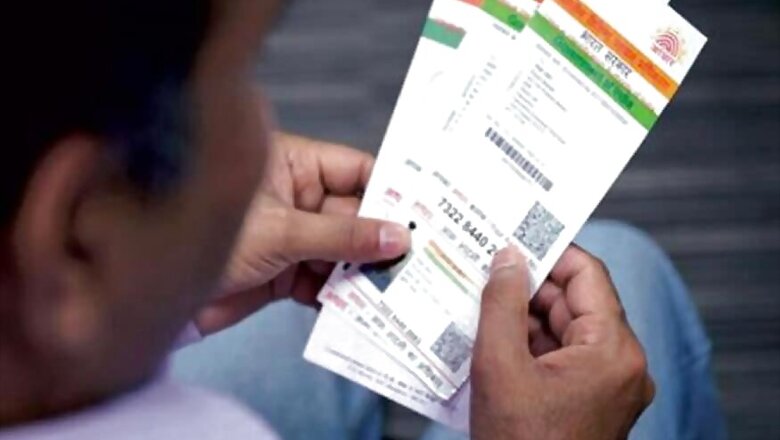
views
On the morning of September 26 the Hon’ble Supreme Court gave its approval to the Aadhaar programme which has been the topic of much discussion and debate over the past few months. The court has held that the Aadhaar cannot be made mandatory and recognised the right of the people to choose to be out of the system, albeit for limited purposes.
Over the last five years, the case has been heard and considered by over 20 judges of the Supreme Court at different stages of the matter. The challenge to the Aadhaar programme was started with the challenge to the notification issued in 2009, which in its entirety was three pages long. The court repeatedly, from as early as 2013, has frowned upon the authorities for making Aadhaar mandatory for availing benefits and directed them to keep it purely voluntary.
While the country waited for a legislation to be passed to give the necessary statutory backing to the Aadhaar programme, almost 100 crore Aadhaar numbers had already been issued by the UIDAI.
The Aadhaar Act was finally passed in 2016, however, as a Money Bill, whereby the Rajya Sabha was not required to vote on it.
During the course of hearing the matter travelled from a three-judge bench (in 2015) to a nine-judge bench (in 2017 for the privacy judgment) and then finally to five-judge bench for the adjudication of the dispute. At the end of it all, the long awaited Aadhaar judgment is finally out.
The Supreme Court by a majority of 4:1 has found the Aadhaar programme and the Aadhaar Act to be constitutionally valid. The lone dissent by Justice DY Chandrachud is a strongly worded judgment. It not only struck down the Aadhaar Act for not being a Money Bill, but also held on merits that the Aadhaar programme in its present form is unconstitutional and violates constitutional morality.
The majority judgment framed as many as 10 issues, including sub-issues. However, I will limit my analysis to only two issues—(i) money bill, and (ii) breach and violation of interim orders.
(i) Money Bill
There are at least two constitutional safeguards which stands lowered where government resorts to the Money Bill procedure. The first bulwark against an incursion on Fundamental Rights is the legislative requirement of proper consideration, debate and discussion in both the Houses of Parliament. Secondly, especially in a case such as this which involves the personal data of over 100 billion individuals – the power of the President under Article 111 to return the Bill.
In the case of the Aadhaar Act, neither of the aforesaid safeguards were available as it came to be passed as a money bill.
The Aadhaar Act is much more than just a legislation which enables the proper distribution of social welfare schemes, the expenditure of which arises out of the Consolidated Fund of India. It is essentially an Act which seeks to provide a “unique id” to citizens, for which it sets up a statutory authority such as UIDAI, frames data protection guidelines and creates offences for violations under the Act. None of these fit into any of the provisions of Article 110 of the Constitution, which provides that “a Bill shall be deemed a Money Bill if it contains only provisions dealing with all or any of the following…”
(ii) Violation and breach of Interim Orders of the Court
The phrase “Aadhaar is purely voluntary” and “Aadhaar cannot be made mandatory” has been repeated many a times in the last 5 years during the court hearing.
The SC has repeated the same at least 5 times between 23.09.2013 (2-Judges) and 15.10.2015 (5-Judges).
However, despite such directions various government authorities, private companies, banks, schools, etc. have continued to insist upon the production of an Aadhaar number to provide any services to individuals. It had been the case of the petitioner that it has been a systematic coercive act on part of all concerned to ensure that every resident gets an Aadhaar number, or be deprived of benefit, which he is otherwise entitled to.
Justice Sikri (in his majority opinion, at paragraph 445) while holding that the government cannot be held for contempt, observes that “when the matter is sub judice in the court and certain orders operating, the respondents should have shown some fairness by taking that route, which expectation would be high where the respondent is the State.”.
The issue with respect to violation of interim orders was not so much about contempt of court, as it was about the Rule of Law. Under Article 144 of the Constitution, every authority must act in aid of the SC. As held by Justice Chandrachud, “dilution of the institutional prestige of this court can only be at the cost of endangering the freedom of over a billion citizens which judicial review seeks to safeguard.”
To conclude, I would call the judgment a success for the Petitioners. From a time when there was little or no discussion/debate about the Aadhaar project, we have come a long way where at least one SC judge has accepted the fears of the Petitioners.
While the apex court has given a fresh lease of life to the Aadhaar programme, it has also raised various concerns with respect to exclusion and data security, which the UIDAI will be ill-advised to ignore.
(The author appeared on behalf of the petitioners challenging the Aadhaar Act before Supreme Court. Views are personal)




















Comments
0 comment